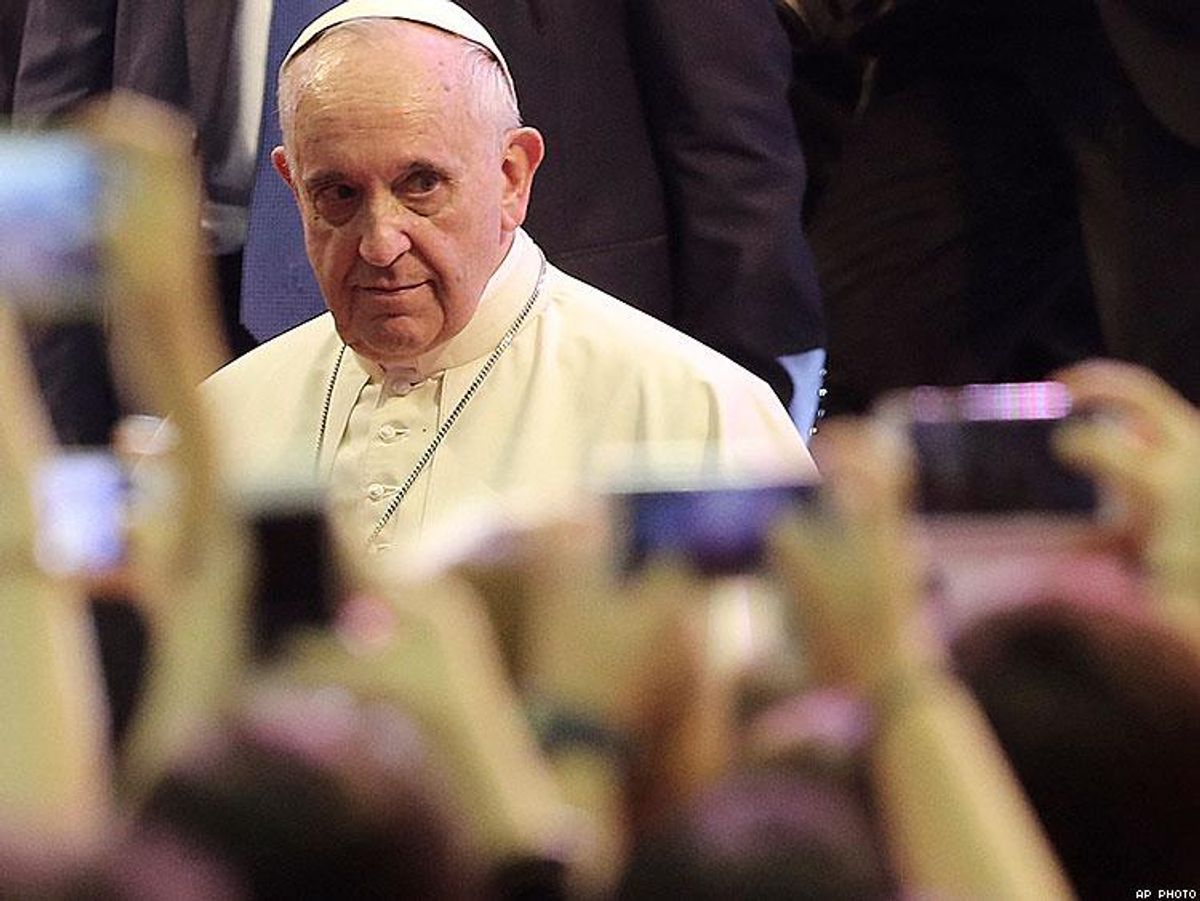Pope Francis has explained and expanded upon his famous "Who am I to judge?" comment in a new book, and while there is nothing particularly revelatory in the discussion, it has been welcomed by some LGBT Catholics and their supporters.
Italian journalist Andrea Tornielli interviewed the pope for The Name of God Is Mercy, to be released Tuesday. He asked Francis to clarify his much-publicized 2013 remark, and the pope had this to say, according to the National Catholic Reporter, which obtained an advance copy of the book:
"On that occasion I said this: If a person is gay and seeks out the Lord and is willing, who am I to judge that person? I was paraphrasing by heart the Catechism of the Catholic Church where it says that these people should be treated with delicacy and not be marginalized."
"I am glad that we are talking about 'homosexual people' because before all else comes the individual person, in his wholeness and dignity," he continued. "And people should not be defined only by their sexual tendencies: let us not forget that God loves all his creatures and we are destined to receive his infinite love."
"I prefer that homosexuals come to confession, that they stay close to the Lord, and that we pray all together," Francis added. "You can advise them to pray, show goodwill, show them the way, and accompany them along it."
Francis DeBernardo, executive director of New Ways Ministry, which advocates for LGBT equality within the Roman Catholic Church, saw reason to be encouraged by the pope's statements.
"While the pope's comments don't fully clarify his approach to LGBT people, these new remarks do highlight some important points about his thinking on lesbian and gay issues," DeBernardo said in a post on the New Ways blog.
Among those points, according to DeBernardo: The pope sees a welcoming approach as consistent with Catholic doctrine, "not a departure from it"; he emphasizes God's love rather than judgment; and he sees LGBT people as individuals and doesn't focus on their sex lives. "Clearly, this pope is not as obsessed with sexual activity as his previous predecessors have been," DeBernardo wrote.
He acknowledged that the mention of confession "can raise a red flag for some," but he cautioned against inferring too much from it. "I don't think he was calling for gay and lesbian people to confess sexual 'sins' based on their orientations and commitments," DeBernardo explained. "From other things he has said ... I think Pope Francis sees confession as a good thing for all people to experience and celebrate God's mercy."
The pope, DeBernardo concluded, "still has some work to do with LGBT issues," but his comments in the book "are a welcome next step in his evolution, and they move the discussion of LGBT issues in the Catholic Church into a much friendlier space than they have ever been."
ThinkProgress contributor Jack Jenkins was less impressed by the pope's words, writing, "The new quotes effectively repeat what is often described as Francis' shift in 'tone' regarding LGBT issues. The pontiff has never contradicted the Catholic Church's official opposition to LGBT relationships, which describes same-sex 'inclinations' as 'objectively disordered.'"
His "tonal tweak," Jenkins added, hasn't changed the way Catholic institutions treat their LGBT staff members, who continue to lose their jobs when they come out in a public way, such as by marrying a same-sex partner. But Jenkins allowed that "Francis is indeed asking the church to 'talk' more about LGBT issues" and that bishops' synods convened by him, while not resulting in "radically different stances on sexuality," did see documents produced that "included language about LGBT people that was arguably more welcoming -- relatively speaking -- than the statements from years past."
The Name of God Is Mercy will be published in 86 countries and about 20 languages, according to the National Catholic Reporter.


















































































